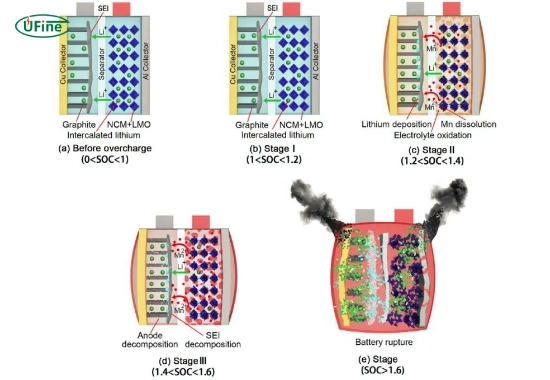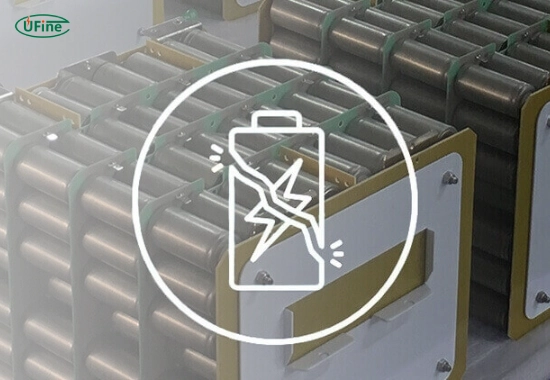When it comes to understanding which type of battery can be overcharged, it is essential to recognize the risks involved in charging batteries beyond their limits. Overcharging can lead to various problems, including reduced battery life and safety hazards. In this article, we will explore the different types of batteries that can be overcharged, the effects of overcharging, and how to prevent it.
Part 1. What is battery overcharging?
Battery overcharging occurs when a battery receives an electrical current after reaching its maximum charge capacity. Many rechargeable batteries can experience this if they are not appropriately monitored during charging.
Overcharging leads to several issues:
- Heat Generation: When a battery is overcharged, it generates excess heat, which can damage its internal components.
- Gas Production: In some batteries, such as lead acid, overcharging causes gas to form. This gas can build up pressure inside the battery, leading to leaks or explosions.
- Chemical Changes: Overcharging can cause unwanted chemical reactions within the battery, reducing its efficiency and lifespan.
Understanding what battery overcharging is helps users take the necessary precautions to avoid damaging their batteries.
Part 2. Which batteries are prone to overcharging?
Not all batteries are equally susceptible to overcharging, but several common types are at risk:
- Lead Acid Batteries: These batteries are widely used in vehicles and other applications. If left on a charger for too long, they can be overcharged, producing hydrogen gas, which can be explosive if ignited.
- Nickel-Cadmium (NiCd) Batteries: NiCd batteries are older technology and can also be prone to overcharging. They suffer from a memory effect, losing capacity if charged before being fully discharged. This makes them less efficient over time.
- Lithium-Ion Batteries: Lithium-ion batteries are popular in smartphones, laptops, and electric vehicles. While they have built-in protection circuits that help prevent overcharging, they can still be damaged if charged for too long or at high temperatures. In extreme cases, this may lead to thermal runaway—a dangerous condition where the battery heats uncontrollably.
Can You Overcharge a Lithium Battery?
Part 3. How does overcharging affect battery performance?
Overcharging has several negative effects on battery performance:
- Increased Heat: As mentioned earlier, excessive charging generates heat. This heat can damage the battery’s internal components and reduce its efficiency.
- Decreased Lifespan: Repeatedly overcharging a battery significantly shortens its lifespan. The more often a battery is overcharged, the less capacity it will have to hold a charge in the future.
- Risk of Leakage and Explosion: Overcharging can cause leakage or explosions due to gas build-up or overheating in severe cases, particularly with lead-acid and lithium-ion batteries.
Understanding these effects highlights the importance of proper charging practices.
Part 4. What are the signs that a battery is being overcharged?
Recognizing the signs of an overcharged battery is crucial for preventing damage:
- Swelling: A swollen battery is often a clear indication of internal pressure build-up due to overcharging. If you notice any swelling in your battery, it’s essential to stop using it immediately.
- Excessive Heat: If your battery feels unusually warm during or after charging, it may be a sign that it is being overcharged.
- Decreased Performance: A noticeable drop in performance or capacity can signal that a battery has been subjected to overcharging repeatedly.
Awareness of these signs allows users to act before severe damage occurs.
Part 5. How can I tell if my car battery is overcharged?
Identifying whether your car battery is overcharged is crucial for maintaining its health and safety. Here are some signs to look out for:
- Check the Voltage: Use a multimeter to measure the voltage of your car battery while it’s running. When charging, a healthy lead-acid car battery should read between 13.7 and 14.7 volts. If it consistently reads above this range, your battery may be overcharged.
- Look for Swelling or Bulging: Just like with other types of batteries, if you notice that your car battery case is swollen or bulging, this could indicate that gas is building up inside due to overcharging.
- Monitor Temperature: If your car battery feels excessively hot after charging or during operation, this could be a sign of overcharging. A warm battery is standard; however, further investigation is needed if it feels hot.
- Check for Acid Leakage: If you see any signs of acid leakage around your car battery terminals or casing, this could indicate that the battery has been overcharged and is venting gases or fluids.
Regularly checking these indicators can help ensure that your car battery remains in good condition and avoid potential hazards associated with overcharging.
Part 6. How does a battery prevent overcharging?
Preventing overcharging is essential for maintaining battery health and safety:
- Use Smart Chargers: Smart chargers are designed to detect when a battery is fully charged and automatically shut off power. Investing in one of these chargers can significantly reduce the risk of overcharging.
- Regular Monitoring: Monitor charging times and ensure that batteries are kept connected only as long as necessary. Setting timers or reminders can help with this task.
- Follow Manufacturer Guidelines: Always adhere to the manufacturer’s charging practices and times recommendations. Each type of battery may have specific requirements for optimal charging.
By implementing these preventive measures, users can protect their batteries from potential damage caused by overcharging.
Part 7. Best practices for charging different battery types
Different types of batteries require specific care during charging:
- Lead Acid Batteries: To avoid overcharging lead acid batteries, charge them at a controlled rate and avoid leaving them connected for extended periods without monitoring their voltage levels.
- Nickel-Cadmium Batteries: Whenever possible, it’s best to fully discharge NiCd batteries before recharging. This practice minimizes memory effect issues and helps maintain their capacity.
- Lithium-Ion Batteries: With lithium-ion batteries, avoid letting them drain entirely before recharging; instead, aim to keep them between 20% and 80% charge for optimal longevity and performance.
Following these best practices ensures that each type of battery operates safely and efficiently while minimizing risks associated with overcharging.
Part 8. FAQs
-
Can all batteries be overcharged?
Only some batteries are equally prone to overcharging; however, most rechargeable batteries have some risk if appropriately managed. -
What happens if I overcharge my lithium-ion battery?
Overcharging a lithium-ion battery can lead to overheating and potentially cause thermal runaway, which may result in fire or explosion. -
How do I know if my battery is overcharged?
Signs include swelling, excessive heat during charging, and decreased performance or capacity. -
Are smart chargers worth it?
Yes! Smart chargers help prevent overcharging by automatically shutting off when the battery is fully charged. -
Can I leave my phone plugged in overnight?
While many modern phones have built-in protections against overcharging, it’s still best practice to unplug them once fully charged to prolong battery life.
Related Tags:
More Articles

How to Choose the Best Floor Scrubber Battery for Commercial Cleaning?
Selecting the ideal floor scrubber battery ensures a long runtime, rapid charging, and minimal maintenance for efficient commercial cleaning operations.
Battery for Blower vs Battery for Leaf Vacuum: Which One Should You Choose?
Battery for blower vs leaf vacuum—learn the key differences in power, fit, and runtime to choose the right battery for your outdoor tool needs.
How to Choose the Right Battery for Blower?
Choosing the right blower battery? Consider voltage, capacity, chemistry & usage. This guide helps match the best battery for peak performance.
How to Choose the Best Insulated Battery Box for Lithium Batteries?
Choosing the Best Insulated Battery Box for Lithium Batteries? Discover key factors such as size, material, and safety for optimal protection and performance.
7 Critical Elements on a Lithium Battery Shipping Label
What must be on a lithium battery shipping label? Learn 7 key elements to ensure safety, legal compliance, and correct handling across all transport modes.





